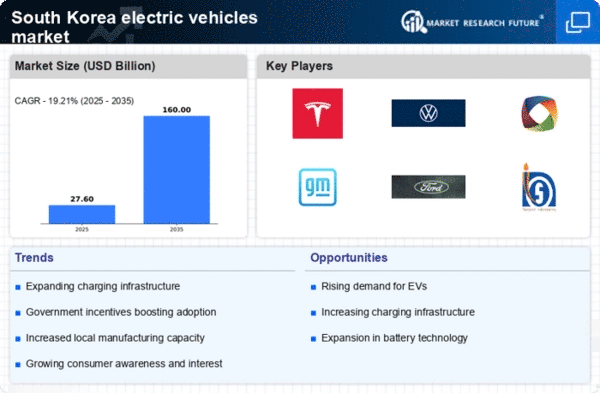Economic Incentives for Consumers
Economic incentives are a driving force in the electric vehicles market in South Korea. The government offers substantial subsidies for electric vehicle purchases, which can amount to as much as $8,000 per vehicle, depending on the model. This financial support lowers the initial cost barrier for consumers, making electric vehicles more accessible. Additionally, tax benefits and exemptions from tolls further enhance the attractiveness of electric vehicles. As a result, the electric vehicles market is witnessing a surge in consumer interest, with sales projected to increase by 30% annually over the next few years.
Regulatory Framework Enhancements
The electric vehicles market in South Korea is experiencing a robust transformation due to the implementation of stringent regulatory frameworks aimed at reducing carbon emissions. The government has established ambitious targets for electric vehicle adoption, with a goal of having 1.13 million electric vehicles on the road by 2025. This regulatory push not only incentivizes manufacturers to innovate but also encourages consumers to transition to electric vehicles. The electric vehicles market is thus benefiting from a clear policy direction that aligns with global sustainability goals, fostering a conducive environment for growth.
Infrastructure Development Initiatives
Infrastructure development plays a pivotal role in the electric vehicles market in South Korea. The government is investing heavily in expanding the charging network, with plans to install over 50,000 charging stations by 2025. This initiative aims to alleviate range anxiety among potential electric vehicle buyers, thereby enhancing market penetration. Furthermore, the electric vehicles market is likely to see increased collaboration between public and private sectors to facilitate the establishment of fast-charging stations, which could significantly boost consumer confidence and adoption rates.
Technological Innovations in Manufacturing
Technological innovations in manufacturing processes are significantly impacting the electric vehicles market in South Korea. Local manufacturers are increasingly adopting advanced production techniques, such as automation and artificial intelligence, to enhance efficiency and reduce costs. This shift not only improves the quality of electric vehicles but also accelerates the time-to-market for new models. The electric vehicles market is thus poised for rapid growth, as these innovations enable manufacturers to meet rising consumer demand while maintaining competitive pricing.
Environmental Awareness and Sustainability Trends
Growing environmental awareness among consumers is reshaping the electric vehicles market in South Korea. As public concern regarding climate change intensifies, more individuals are opting for electric vehicles as a sustainable alternative to traditional combustion engines. This shift in consumer behavior is reflected in market surveys indicating that over 60% of potential car buyers are considering electric vehicles for their next purchase. The electric vehicles market is likely to benefit from this trend, as manufacturers align their offerings with the increasing demand for eco-friendly transportation solutions.
















